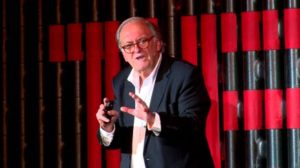Company: Where companions are. Companion = com + panis in Latin, that is with bread, sharing bread of food. ‘Travelling companion’ = sharing the bread. Company as business association (with lots of companions sharing bread!?) starts in the 16th Century. Before that, the word is used in the military as a subdivision of infantry. Troops? Employees? Bread together? The Old French used as society. A company is still in France a societe, Spanish a sociedad, Italian societa. English, company.
Community: Latin communis. The word includes ‘common’: united, belonging equally to. As in ‘the commons’, which is of all of us. The word evolved to imply fellowship, community of relationships, even feelings; then adopted in Old English. Then, association, social group. In Medieval Latin the word was used like in ‘universitas’, as body of fellows or fellow townsmen. Community: having in common.
There are interesting overlapping etymologies between the two words. Both coming from an origin of ‘we are here together’, sharing the bread, sharing the journey, being fellows. The business use must have taken the route of the ‘company’, so did the military, whilst ‘community’ took a route of public affairs. In English towns, the public green space in the middle, around which the houses are built, is called ‘the commons’. This is the connection with ‘The Tragedy of the Commons’.
What if we, in companies, reclaim, take back part or all of the original ‘commons’ with communities? What if we saw ourselves, as leaders, as leading a community? I’d say that a few things would look, feel, smell and be different.
- Leaders become ‘community organisers’. (Tip: Obama was originally dismissed as ‘just a community organiser’)
- Community has the root of ‘commons’, the commons, what we share. Communities share resources, perhaps for the common (again) good. Companies tend to compete for resources internally: my budget, your budget. Community: it’s all one basket. Do you want a better ‘one company alignment’?
- Companies have locations, sites, and affiliates. Communities have places and spaces and offices. As part of Community X I am working today in office A and next week in office B. But I belong to the community X. My space is the community, my place is where ever I need to work today. To the extreme: I am on the payroll of the (global) Community (just under local employment law)
- Communities care about their members, they foster a sense of belonging and may be strong in values and the ‘how’ we do things. Not that companies can’t do that, but communities provide a more natural space
A true disruptive and serious 21st Century concept of the company is one of a ‘platform’ (of technologies, processes, people, advantages…). I don’t have much space here to elaborate, but, platform sits better in a community model than in a company with its traditional ‘fixed’ structures.
Let’s launch this thinking and see how far we can go. Shall we?
___________________________________________________________________________
Dr Leandro Herrero is the CEO and Chief Organization Architect of The Chalfont Project [1], an international firm of organizational architects, and the pioneer of Viral Change™ [2], a people Mobilizing Platform, a methodology that delivers sustainable, large scale behavioural and cultural change in organizations.
An international speaker, Dr Herrero is regularly invited to speak at global conferences and corporate events. To invite Leandro to speak at your conference or business event contact: The Chalfont Project [3] or email: [email protected]. [4]

_____________________________________________________________________________
The Chalfont Project – Your Organization Architects
If you want to build a remarkable organization, and are perhaps ready to challenge your status quo, we are your organizational architects. If you need the best leadership, if you want a collaborative environment, mastering change, and instilling radical management innovation we promise you’ll have them. Work with us. We won’t tell you things just because you want to hear them.
Visit The Chalfont Project [1] to find out more or contact us now [3].
